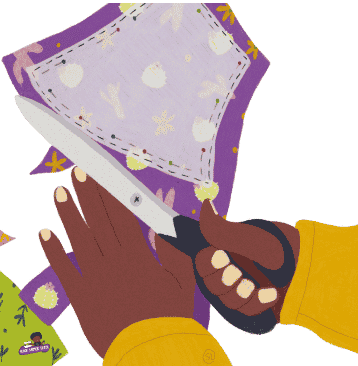Registration info: KINDRED SPIRITS: AN AFRICAN AMERICAN QUILTERS CONVERGENCE, June 15-17, 2023, Durham, NC
Sign up for the Black Women Stitch quarterly newsletter! Check out our merch too!
Leave a BACKSTITCH message and tell us about your favorite episode.
Join the Black Women Stitch Patreon
Black Women Stitch 2023 Wall Calendar
Porfiria Gomez
Porfiria Gomez is a sewing enthusiast, a designer, and a blogger. Her love of sewing began as a child and is a native New Yorker. In 2014, she began sharing her passion with others - with her Sewing 101 classes. Today, she continues to train and learn as much as she can about the beautiful world of sewing, cooking blogging, and living her best life as a maker.
Lisa Woolfork
Lisa Woolfork is an associate professor of English specializing in African American literature and culture. Her teaching and research explore Black women writers, Black identity, trauma theory, and American slavery. She is the founder of Black Women Stitch, the sewing group where Black lives matter. She is also the host/producer of Stitch Please, a weekly audio podcast that centers on Black women, girls, and femmes in sewing. In the summer of 2017, she actively resisted the white supremacist marches in her community, Charlottesville, Virginia. The city became a symbol of lethal resurging white supremacist violence. She remains active in a variety of university and community initiatives, including the Community Engaged Scholars program. She believes in the power of creative liberation.
Insights from this episode:
- Porfiria’s sewing story
- Details into her early days of blogging
- Juggling between being a mom and quilting
- How she came up with the name ‘Eat. Quilt. Joy’
- Details about her upcoming book
- Details about her quilt projects
- Redefining the misconceptions of quilting
Quotes from the show:
- “When I got pregnant with my first son, I just remember wanting to create something with my hands and I think I identify that with family” —Porfiria Gomez in “Stitch Please”
- “I really like how it seems as though three different modes of creation were coming together for you at one time: you were growing a child, a life in your body and you are learning about quilting” —Lisa Woolfork in “Stitch Please”
- “Family brings so much joy to my life and I think we take life for granted and we don’t enjoy the joyous things” —Porfiria Gomez in “Stitch Please”
- “Eat Quilt Joy essentially sums up who I am (…) if I am not quilting, I’m cooking, if I’m not cooking, I’m quilting” —Porfiria Gomez in “Stitch Please”
- “I was trying to do it all. I wanted to create some sort of community for me as I was going on this journey to being a mom” —Porfiria Gomez in “Stitch Please”
- “For me, I wanted to be the change that I wanted to see (…) I couldn’t understand for the life of me why the boxes didn’t look like me: why in modern quilting, I didn’t find people who looked like me” —Porfiria Gomez in “Stitch Please”
Stay Connected:
Lisa Woolfork
Instagram: Lisa Woolfork
Twitter: Lisa Woolfork
Porfiria Gomez
Website: Porfiria Gomez
Instagram: Eat.Quilt.Joy (@mrsporfiria)
This episode was produced and managed by Podcast Laundry.
Sign up for the Black Women Stitch quarterly newsletter
Check out our merch here
Leave a BACKSTITCH message and tell us about your favorite episode.
Join the Black Women Stitch Patreon
Check out our Amazon Store
Stay Connected:
YouTube: Black Women Stitch
Instagram: Black Women Stitch
Facebook: Stitch Please Podcast


